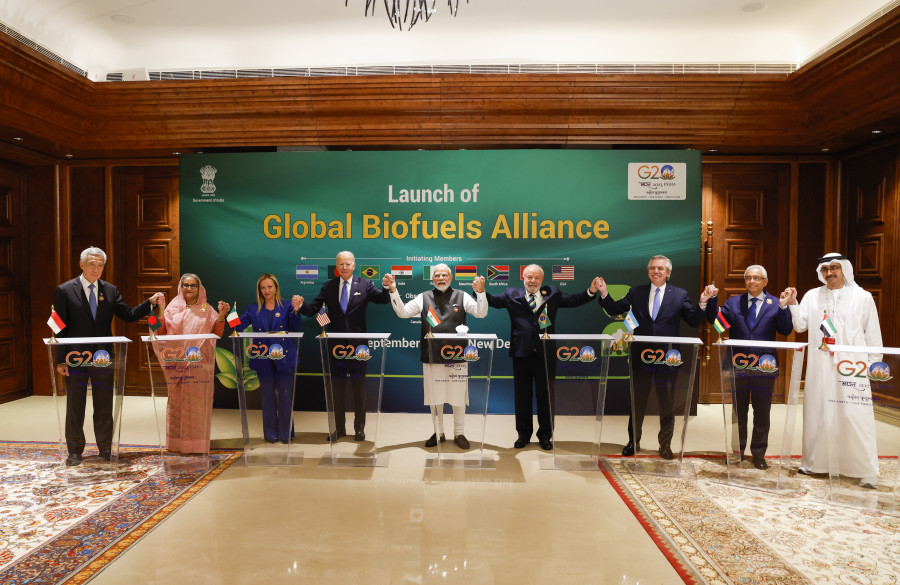Columns
G20 takeaways
It will remain a pillar of multilateral cooperation to advance the economic interests of the states.
Smruti S Pattanaik
India hosted the Group of 20 summit on September 9-10 at the Bharat Mandapam in New Delhi. Its 20 member countries, nine invited countries, and delegates and representatives from several international organisations engaged in meaningful discussions on the agenda and how to take the process forward. At the end of the meeting, the group came out with the Delhi Declaration, an outcome of several days of intensive negotiations on language and content that was acceptable to all the participating countries. Consensus itself was a challenging task.
Important absentees at the summit were Chinese President Xi Jinping, represented by his Prime Minister Li Qiang, and Russian President Vladimir Putin, represented by his Foreign Minister Sergei Lavrov. There are several speculations regarding the absence of Xi and Putin, who are seen as important geo-political partners. While some attribute Xi’s absence to China’s relations with India, and perhaps its desire for an alternative world order through the Chinese-led BRICS and Shanghai Cooperation Organisation, others have attributed this absence to China’s economic woes. Chinese newspaper Global Times in its editorial painted the United States as the spoiler at the G20 and not China. However, Chinese Prime Minister Li termed the summit a success.
The Global South
Given the war in Ukraine, the Russian president has been missing the G20 summit since last year. However, unlike the Bali Declaration, the New Delhi Declaration stating “Today’s era must not be of war” emphasised constructive initiative for durable peace in Ukraine based on the UN Charter. Russian Foreign Minister described this language change as a failure of Western countries to “Ukrainise” the G20 and a win by the Global South. China has been critical of the hijacking of the economic agenda of the G20 for geopolitical ends by the Western powers. Notwithstanding the geopolitics that has become a hallmark of multilateral initiatives, the New Delhi summit succeeded on several fronts. Yet, India successfully highlighted the issues concerning the Global South in the 83-point comprehensive document that constituted the summit declaration.
While building consensus for a summit declaration was important, the admission of the Africa Union consisting of 50 countries as a permanent member of the G20 provided the Global South a major voice. India had invited some African countries like Nigeria, Egypt and Mauritius as guests to attend the G20 summit. From the South Asian region, only Bangladesh was invited. No economic grouping can ignore the African voice at any such forum.
Emerging economies are confronted with debt issues, and debt relief has been entangled with geopolitics. As part of the G20 debt restructuring, the debt of Chad has been restructured, and Zambia, Ghana and Ethiopia's situation is being discussed with no relief in sight. With the urging of the World Bank and the International Monetary Fund, the G20 had established the Debt Service Suspension Initiative that suspended $12.9 billion in debt-service payments owed by participating countries to their creditors.
Important initiatives
Two initiatives that stood out were the Global Biofuels Alliance and the economic corridor linking India with the Middle East and Europe. Nineteen countries and 12 international organisations have already agreed to join this initiative, which is key to energy transition, one of the seven priority areas identified under India’s G20 presidency. Sustainable and environment-friendly biofuel is also key to achieving net zero. According to reports, 4 percent of total transport energy supply in 2022 came from biofuel. As climate change remains a major concern for the region's countries, this initiative will help them address the challenge of climate change.
The connectivity between the India-Middle East-Europe Economic Corridor, consisting of the east and northern corridors, is considered to be the most ambitious announcement at the G20. Saudi Arabia, the European Union, India, the United Arab Emirates, France, Germany, Italy and the US signed a memorandum of understanding. Some argue that this could be an alternative to the Chinese-led BRI; others argue that it is too ambitious in scope as it involves energy connectivity and telecommunication apart from being a multimodal connectivity project. This transformative regional investment corridor would be one example of a multilateral partnership between governments and the private sectors. It is important to note that the countries propose to meet again in the next two months to concretise the financial aspect to this corridor, which will shape this proposal. Once operationalised, this will help connect Asia to Europe and be part of several implemented connectivity projects. It will likely reduce the time and cost of transporting goods between India and Europe by 30 to 40 percent.
Global geopolitics is in flux. While a multipolar world is desirable, the Russia-Ukraine war has divided the countries in several ways. The successful completion of the G20 summit has helped India to push forward the agenda of climate change, Sustainable Development Goals, clean energy production and digital transformation. It has also put focus on economic multilateralism and reform of global financial institutions that have emerged as a major stumbling block in advancing the cause of developing countries. The G20 will remain an important pillar of multilateral cooperation to advance the economic interests of the states in a geopolitically fragile world order.




 9.12°C Kathmandu
9.12°C Kathmandu















